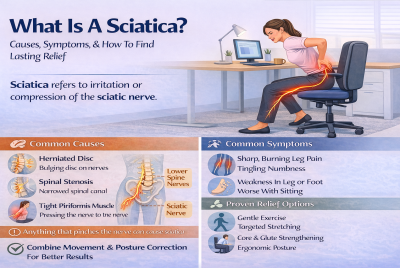Will Sciatica Go Away?
Discover if sciatica will go away on its own and explore effective treatments, self-care tips, and prevention strategies for lasting relief. Let’s talk about sciatica. If you’re dealing with this pesky condition, you’re probably wondering, “Will sciatica go away?” I totally get it—sciatica can be a real pain, literally. In this article, I’m going to break down everything you need to know about sciatica, from what causes it to how you can find relief. Trust me, there’s hope!
Understanding Sciatica
Definition of Sciatica
Sciatica isn’t just your average back pain. It’s a specific type of discomfort that happens when something (usually a herniated disc or bone spur) presses on your sciatic nerve. This nerve runs from your lower back, through your hips and buttocks, and down each leg. So, when it’s irritated, the pain can travel all the way from your back to your toes.
Common Causes of Sciatica
Herniated Discs
One of the most common culprits behind sciatica is a herniated disc. Imagine one of your spinal discs slipping out of place and pressing on a nerve. Ouch, right?
Spinal Stenosis
Then there’s spinal stenosis, which is a fancy term for when the spaces within your spine start to narrow. This can put pressure on the nerves that travel through your spine, including the sciatic nerve.
Piriformis Syndrome
Another cause is piriformis syndrome. The piriformis muscle is a small muscle located deep in the buttock. If it spasms or tightens, it can compress the sciatic nerve.
Symptoms of Sciatica
Pain Distribution
Sciatica pain can vary quite a bit. Some people feel a mild ache, while others experience a sharp, burning sensation. The pain usually follows the path of the sciatic nerve—from the lower back through the buttock and down the leg.
Other Related Symptoms
Along with pain, you might notice numbness, tingling, or muscle weakness in the affected leg or foot. Sometimes, it can feel like an electric shock shooting down your leg.
Can Sciatica Go Away on Its Own?
Mild vs. Severe Cases
Here’s the good news: in many cases, sciatica can go away on its own, especially if it’s a mild case. For some folks, the pain might subside within a few weeks.
Timeframe for Recovery
Most people with sciatica get better in a few weeks to a few months. However, if your pain is severe or not improving, it’s time to see a doctor.
Self-Care and Home Remedies
Importance of Staying Active
Believe it or not, staying active is one of the best things you can do for sciatica. Resting too much can actually make the pain worse. Gentle activities like walking or swimming can help keep your spine healthy.
Stretching and Exercises
Stretching and strengthening exercises can also work wonders. Focus on exercises that stretch your lower back, hamstrings, and hips. Yoga can be particularly helpful.
Heat and Cold Therapy
Applying heat or cold packs to the affected area can provide some temporary relief. Try alternating between heat and cold to see what works best for you.
Medical Treatments for Sciatica
Over-the-Counter Medications
Over-the-counter medications like ibuprofen or acetaminophen can be quite effective for pain relief. They can help reduce inflammation and manage pain.
Prescription Medications
If your pain is more severe, your doctor might prescribe stronger medications, like muscle relaxants or anti-inflammatories.
Physical Therapy
Physical therapy is another great option. A therapist can teach you specific exercises and stretches to improve your condition and prevent future episodes.
Alternative Therapies
Chiropractic Care
Chiropractors specialize in spinal manipulation and can often relieve sciatica pain. If traditional treatments aren’t working, it’s worth trying chiropractic care.
Acupuncture
Acupuncture involves inserting thin needles into specific points on the body. Some people find it helps reduce their sciatica pain.
Massage Therapy
Massage therapy can also help by relieving muscle tension and improving circulation in the affected area.
When to See a Doctor
Warning Signs of Serious Conditions
While many cases of sciatica improve with self-care, there are times when you should see a doctor. If you experience severe pain, sudden numbness, or weakness in your leg, or loss of bladder or bowel control, seek medical attention immediately.
Diagnostic Tests
Your doctor might recommend imaging tests, such as an MRI or CT scan, to examine the cause of your pain more closely.
Preventing Sciatica Recurrence
Proper Posture
Good posture is key to preventing sciatica. Make sure you’re sitting and standing properly to reduce strain on your back.
Ergonomics at Work
Set up your workstation to support good posture. Use a chair with proper back support and keep your feet flat on the floor.
Regular Exercise
Regular exercise helps keep your spine healthy. Aim for a mix of cardio, strength training, and flexibility exercises.
Lifestyle Changes for Long-term Relief
Weight Management
Maintaining a healthy weight reduces the strain on your spine and can help prevent sciatica.
Smoking Cessation
If you smoke, quitting can improve blood flow to your spine and reduce your risk of sciatica.
Healthy Diet
Eating a balanced diet supports overall health and can help you maintain a healthy weight.
Personal Stories and Experiences
Real-Life Recovery Stories
Hearing from others who have dealt with sciatica can be incredibly encouraging. Many people have overcome this condition and returned to their normal activities.
Lessons Learned
From these stories, you can learn valuable tips and tricks for managing and preventing sciatica.
Frequently Asked Questions (FAQs)
What activities should I avoid with sciatica?
Avoid activities that involve heavy lifting, twisting your back, or sitting for long periods. These can aggravate your symptoms.
Can sciatica lead to permanent nerve damage?
In rare cases, untreated severe sciatic pain can lead to permanent nerve damage. It’s important to seek medical attention if your symptoms are severe.
Is surgery always necessary for sciatic pain?
No, surgery is usually considered a last resort. Most people find relief with non-surgical treatments.
How can I sleep comfortably with sciatic pain?
Try sleeping on your side with a pillow between your knees or on your back with a pillow under your knees. This can help keep your spine in a neutral position.
What are the best exercises for sciatica relief?
Exercises that stretch your lower back and hamstrings, like yoga or gentle stretching routines, are often the most effective for relieving sciatic pain.
Will Sciatica Go Away? – Conclusion
To sum it up, yes, sciatica can go away, especially with the right self-care and treatment. Whether you’re dealing with a mild case or something more severe, there are plenty of options to help you find relief. Don’t lose hope—many people have successfully managed their sciatica, and you can too.
Disclaimer
This article is for informational purposes only and is not a substitute for professional medical advice, diagnosis, or treatment. Always consult with your healthcare provider before starting a new exercise or stretching routine, especially if you have existing back or nerve conditions.
👉 Explore more:
- What is the Most Successful Treatment for Sciatica
- What is the Main Cause of Sciatica
- What is the Fastest Way to Cure Sciatica





